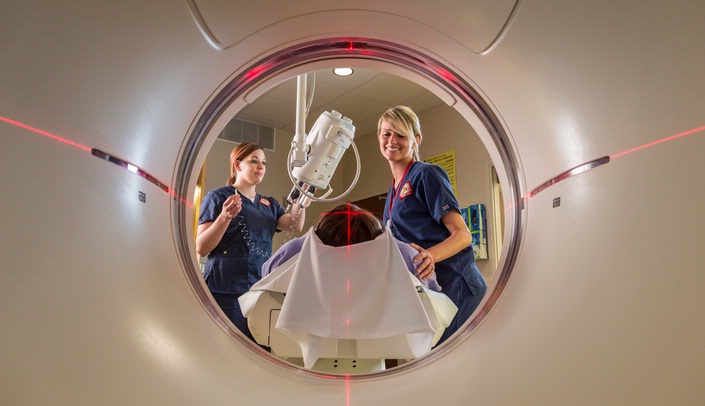The Charles R. O'Malley Charitable Lead Trust, as part of the University of Nebraska “Our Students, Our Future” Initiative, has given a gift to the College of Allied Health Professions that has the potential to be the largest in the college's history. The gift includes both outright funds and the pledge of matching funds to endow the allied health Scholars Program.
The O'Malley Trust first established a relationship with the college (then a school) in 2010, when it established allied health's first endowed faculty position. UNMC named James Temme the Charles R. O'Malley Chair of Radiation Science Technology Education. (UNMC's former RSTE division is now the department of medical imaging and therapeutic sciences.)
Since then, the trust also has matched the funding of other allied health benefactors, partnering to endow five more faculty positions in the college.
But now, the O'Malley Trust has pledged its biggest gift yet – which could mean up to $1.9 million toward scholarships for allied health students.
The trust will gift $900,000 outright to allied health over the next seven years. These monies allow the college to endow funds for a cohort of “O'Malley Scholars.”
Then, the O'Malley Trust will provide an additional $500,000 if matched by other allied health benefactors, for an additional total of $1 million, through 2022.
The matching arrangement allows benefactors to endow their own named scholarships, with the benefit of doubling their gift (see sidebar).
“This innovative and collaborative model offered by the O'Malley Trust is indicative of their approach,” said College of Allied Health Professions Dean Kyle Meyer, Ph.D. “Their goal quite simply is to transform the College of Allied Health Professions – first its faculty, now its students – and there is little doubt they have achieved this outcome.”
The scholarships are to help increase opportunities for underrepresented students largely from Nebraska to become health care professionals. The O'Malley Trust and fellow benefactors will help UNMC and its students create a high quality, diverse workforce to serve all of Nebraska – including its medically underserved areas – for years to come.
“Our objective is to effectively compete for students to meet our state's health care needs,” Dr. Meyer said. “Building a pipeline to serve rural and underserved communities begins with recruiting highly qualified students from these areas and providing them with support to pursue affordable health professions education.”
When completed, the funds from the allied health Scholars endowment will double the annual scholarship funds currently available for allied health students.
